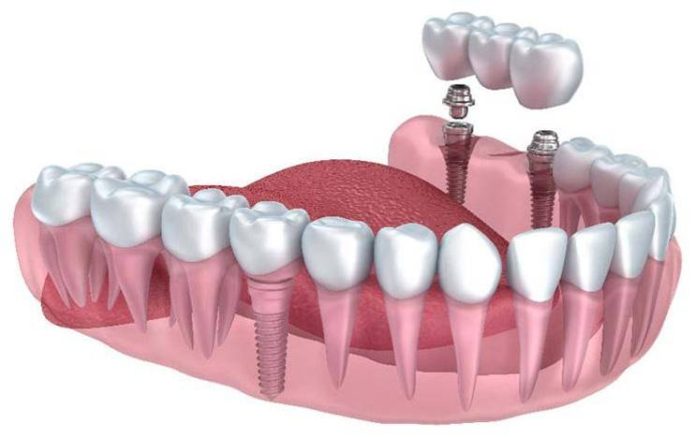Missing teeth are not only bad for the mouth. They can also affect your general health and self-esteem. When you are losing teeth, there is nothing to be ashamed of. Tooth loss is quite common, not only in older people but also in younger people. Almost 70% of adults aged 35 to 44 have at least one missing tooth, and 1 in 4 people over 74 have all missing teeth.
However, dentures and dental implants have opened a new world to them. Dental implants and dentures can help restore confidence in your smile and keep your mouth healthy. If you are unable to decide, we will share the pros and cons of each option:
Dentures
Dentures are removable teeth that can be adjusted to fit in the mouth, no matter how much bone there is.
Dentures can be a complete set to replace all teeth in the upper or lower jaw or to replace some missing teeth. These are called partial dentures.
Before creating dentures for your teeth, the dentist gets an impression of your gums and tissue around the teeth, upper gums, lower gums, or both, if you choose to replace all the teeth.
Dental Implants
A dental implant is made by first extracting a damaged root. After the root is gone, or if the root has already been removed, a hole is made in the jawbone.
A prosthetic metal root, called a pin, is implanted deep into the bone. The top of the post is crowned, but only after the bones have grown around the post and secured it in place.
It may take a few months for the brooch to be ready to receive an abutment to which the crown will be attached. Sometimes the abutment is placed during the implantation of the abutment.
The final step is to place a crown – an artificial tooth designed to match adjacent teeth – on the abutment.
Longevity
Dental implants are definitely winning. If you take good care of your implants, they can last as long as your natural teeth. Dentures, on the other hand, usually need to be replaced every five to eight years.
Functionality
Although dental implants are not a substitute comparable to a natural tooth, they are made of titanium and are comparable in strength and performance to natural teeth. The same does not happen with dentures, which can slip and slide in the mouth and sometimes make it difficult to speak or eat. Although modern dentures have evolved a lot, they still fall short of the durability of dental implants.
Aesthetics
Dental implants generally look more natural than dentures. Implants look and work very naturally and are similar to your own teeth. In comparison, dentures can appear bulky. However, if you have your custom prostheses done professionally, most people will not be able to notice the difference. It just depends on how much you are willing to pay.
Need of Anesthesia
The process of obtaining dentures is non-invasive, so you don’t need to be anesthetized, and a dentist needs to pierce the bone. Dentures allow the mouth to heal after tooth extraction. However, the process of dental implants involves surgery, and the patient requires anesthesia to reduce the sensation of pain during the procedure.
Comfort
Because dental implants are literally fused to your jaw, they are natural and comfortable in your mouth and generally do not cause discomfort, especially if you have them for a few weeks. Dentures can be a little more uncomfortable. Bulky and excessive salivation, pain, and irritation are common complaints. Although you get used to your dentures after a few months, the fact that dental implants are an integral part of your mouth usually makes them a more convenient option.
Cost
The price of dental implants depends on the number of additional procedures you need to perform. It is also important to note that your insurance company can cover up to 50% of the cost of your dentures, while dental implants are much less likely to be covered by your dental insurance. However, as dentures generally don’t last as long, consider the cost of replacing them. This can make dentures more expensive than dental implants in the long run.
Long-term oral health
By stimulating the forces generated by chewing, implants help maintain bones and prevent gum tissue from shrinking. It also reduces the risk of losing more teeth. Dentures, on the other hand, do not have this effect. In fact, a poorly fitting restoration can, in some cases, even accelerate bone loss.
Oral hygiene
Dentures should be cleaned thoroughly every day. However, implants can be taken care of by simply brushing your teeth and flossing, just like you would with normal teeth.
Final Words
Both dentures and dental implants have their own benefits and disadvantages. Now, as you have read the comparison of both on the basis of several factors, you can decide which to choose as per your requirements.
















